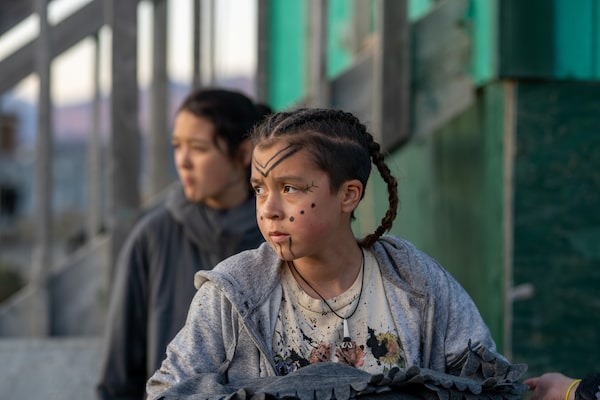Nyla Innuksuk, director of Slash/Back, in Pangnirtung, Nunavut, the community where the film takes place, on May 11.Pat Kane/The Globe and Mail
You can’t get a better glimpse into the mindset of a filmmaker than this: In 2016, the week before she pitched at the Toronto International Film Festival the idea that would become the new teenage horror-adventure movie Slash/Back, the writer/director Nyla Innuksuk was told by doctors that she had a fifty-fifty chance of surviving the month, due to a liver condition. And her first thought was, “I can’t die, I haven’t made the movie yet!”
“It seems insane now,” Innuksuk said, laughing, in a video interview last week from her home in Toronto. “But I knew I had to do something that came from me.”
On the wall behind her as we spoke hung a Saimaiyu Akesuk print of a fat orange bug, one of the Arctic’s gentler monsters. Innuksuk, 35, grew up in Iqaluit immersed in the legends of Ijiraqs, “riding my bike with my brothers and friends, imagining fantastical scenarios – maybe a little more obsessively than most kids.” She mainlined E.T. and The Goonies, but also The Shining, The Sixth Sense, the Scream franchise and Hitchcock’s films. “Anthony Perkins in Psycho was my high school crush, which I see now is problematic,” she says, laughing again.
Her TIFF pitch for Slash/Back was a winner: Four Inuit teenage girls battle aliens in Pangnirtung, Nunavut. Everyone who heard it said, “Cool!” But she initially pictured herself co-writing (with Ryan Cavan) and producing, not directing. “I was scared of saying, ‘I want to,’” Innuksuk says. But getting a liver transplant and then getting better convinced her she could do it all. (Interestingly, the alien spaceship in Slash/Back looks a lot like a liver.)
Good thing her will was strong, because making a first feature with fledgling actors and crew in Pangnirtung, an Inuit community of 1,600 located just below the Arctic Circle, accessible only by boat or plane, threw up a lot of challenges. Innuksuk had fallen in love with Pang’s pristine vistas of hills and fjords when she was 20. As a film production student at Toronto Metropolitan University (formerly Ryerson), she made a documentary short there with the National Film Board about square dancing in pockets of the Arctic.
“In the 1800s, Scottish whalers came to places like Pang with instruments and dances, and now square dancing is considered an Inuit tradition,” Innuksuk says. Her brother, sister-in-law and two nephews live there, and she wanted to make a film for them. (One of her nephews ended up in the cast.) “But nothing would have been possible,” she emphasizes, “if the community hadn’t been on board with all of us coming in.”

Nalajoss Ellsworth as Uki in Slash/Back.Courtesy of Mixtape SB Productions Inc. / Mongrel Media
There are no casting agents in Nunavut, so she partnered with a local artist, Christine Tootoo, to set up acting workshops in a small house that’s been converted into a community art space. About 20 girls aged 11 to 14 showed up, including Alexis Vincent-Wolfe, who plays the flirty Jesse; and Chelsea Prusky, who plays the well-behaved Leena. (Nalajoss Ellsworth plays Uki, the tough one, and Tasiana Shirley plays Maika, the leader.) “It was invigorating to be with them, to see how excited they were,” Innuksuk says.
There are no hotels in Pangnirtung, either, so the production took over two local schools. They flew in 60 beds and mattresses, two per classroom. “Everyone got a roommate and a big roll of garbage bags to cover the windows, because it was 24-hour sunlight,” Innuksuk said. Kids and chaperones slept in the grade school; adults in the high school. Some classrooms became wardrobe and makeup rooms. Three meals a day were served in the high school gym. Eventually sugar was banned from the set, because too many kids were spending their per diems (daily cash expenses) on candy and bouncing off the walls.
Everyone who owned a snowmobile was enlisted for something. A freshly-killed seal was required and found. And securing willing financiers is never easy in Canadian independent film, but it was especially tough for an Arctic location with no-name stars. “We were learning a million lessons a day, like jumping into freezing cold water and seeing if we could swim,” Innuksuk says. “And then doing it again tomorrow and the next day and the next. I’m so proud of what we accomplished.”
Innuksuk is currently writing her next feature script; she’s also a creator of virtual-reality content, and the CEO of Mixtape VR. She and Toronto-based comic book writer Jim Zub “got together over a series of deep-fried donuts” and created a female Marvel hero, Snowguard, who hails from Pang and looks like Innuksuk crossed with her sister-in-law, Julie. “My nephews are obsessed with Spider-Man,” she says. “The idea that a character who looks like their mom could hang out with Spider-Man is so cool to me. And now she’s a Marvel property, she can go on adventures without me.”

Innuksuk on the set of Slash/Back.Ksenia Stassiouk/Courtesy of Mixtape SB Productions Inc. / Mongrel Media
Like every good horror film, Slash/Back weaves social issues into its genre conventions: the teenagers’ ambivalence about their indigeneity; the alcoholism that plagues their community; the ever-present threat of colonization; and the Land Back movement. (For the final battle, Maika girds herself in a jacket that reads “No Justice on Stolen Land” in Inuktitut, and in the end credits, the title Slash/Back transforms into Land/Back.)
“When I was a teenager, horror was for me escapist and thrilling and fun. Now it’s a beautiful way to layer stories with themes that give a movie heart and emotional weight,” Innuksuk says. “Scary movies helped me figure out who I was, trying on different aspects of my personality to see what fit. Now I see that same thing in my teenage actors.”
She’s happy that her film reminds southern audiences that “teenage girls are teenage girls, no matter where you are,” she says. “When I was hanging out with the cast finishing the script, we’d be hunting, or out on boats, or going to cabins, and all the girls would talk about was their friends, boys, who’s dating who, Justin Bieber. Things that I could have been talking about 20 years ago.”
One thing has changed for the better: When Innuksuk was developing Slash/Back in 2017, she had to fight to include Indigenous people in every department of her crew, along with training and mentorship. “These things are more commonplace now,” she says. “It’s so exciting to be making films at a time when many of my colleagues are making their own work, empowering their own communities. I struggled with where I came from. So to be at the South by Southwest Film Festival with Chelsea, in her Inuit earrings that she made herself, thanking this Texas audience in Inuktitut – it was a special moment for me, to see her so confident in who she is and where she comes from.” A moment worth living for.
Slash/Back opens in select theatres June 24; also available on-demand
Special to The Globe and Mail
Sign up for The Globe’s arts and lifestyle newsletters for more news, columns and advice in your inbox.